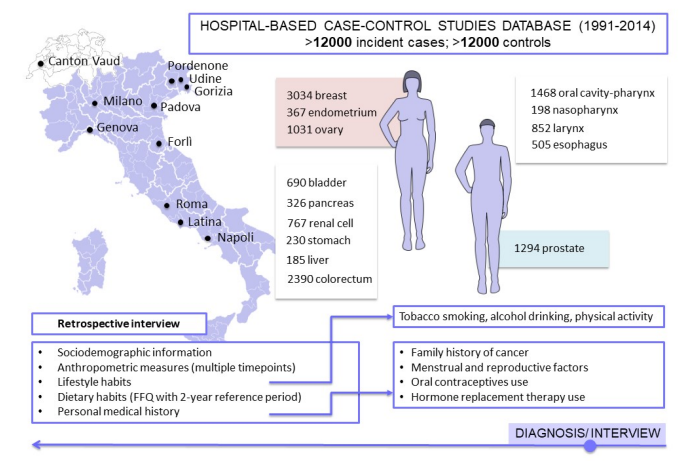PRIN2022 - INDACO-Incorporating Nonadditivity and nonlinearity within the Dietary patterns And Cancer risk association: statistics and machine learning to create novel research Opportunities from dietary assessment to cancer prediction

Titolo progetto: PRIN2022 - INDACO-Incorporating Nonadditivity and nonlinearity within the Dietary patterns And Cancer risk association: statistics and machine learning to create novel research Opportunities from dietary assessment to cancer prediction
Programma di finanziamento: PRIN 2022
Responsabile scientifico: prof.ssa Maria Parpinel
Ruolo del DAME: partner
Descrizione generale:
BACKGROUND AND OBJECTIVES: Suboptimal diet has recently surpassed smoking as the leading risk factor for noncommunicable disease morbidity and mortality in the Global Burden of Disease Study. In particular, among the various risk factors for cancer, diet quality (e.g., Mediterranean diet) and quantity of food consumed have long been one of the main objectives of Public Health. Although diet may not inherently be as a strong risk factor as others, limitations in data collection and analysis paradigms contribute to a reduced ability to identify these effects accurately. Challenges include barriers to accurate and precise measurement of diet, appropriately modeling diet complexity, and residual confounding. The INDACO project is aimed at using novel statistical and machine learning (ML) approaches to tackle the previous challenges. The project will be divided in four main objectives: 1.Exploring nonlinearity and nonadditivity within the association between dietary patterns and cancer risk; 2.Evaluating the identified cancer risk prediction/classification models using newly and previously collected data from an Italian validation study and Swiss case-control studies, respectively; 3.Exploring the potential of machine learning approaches in support of novel image-based dietary assessment tools; 4. Validating results from machine-learning based image approach versus a newly collected pilot study of food images, food recipes, and nutrient intakes. EXPECTED RESULTS AND IMPACT: With its team of competent experts, the INDACO project will define novel machine learning and statistical approaches to better leverage the full richness of diet in modelling health outcomes by incorporating more dietary variables and by accounting for nonlinear and nonadditive relations among them and with confounding factors. Furthermore, the INDACO project will validate ML approaches on an Italian dataset of food images and weights to provide opportunities in future development of technological dietary assessment tools. The INDACO project is expected to have a (long-term) impact on various levels: 1) on Italian and international research in nutritional epidemiology, statistics, and nutrition; 2) on the health of the Italian population by promoting effective public health messages, public awareness about diet and cancer risk factors, and the individual monitoring of these aspects; 3) on Italian economy by potentially reducing the preventable burden of a major chronic disease like cancer and providing background for future commercial exploitation of image-based dietary assessment tools.

Partner del progetto:
- Dipartimento di Scienze Cliniche e di Comunità, Università degli studi di Milano
- Dipartimento di Area Medica, Università degli studi di Udine
- Dipartimento di Scienze Economiche, Aziendali, Matematiche e Statistiche, Università degli studi di Trieste
Date inizio e fine progetto: 16.10.2023 – 15.10.2025
Budget totale del progetto: 79.242,00€
Sito web: https://prin.mur.gov.it/
Finanziato dall’Unione europea – Next Generation EU